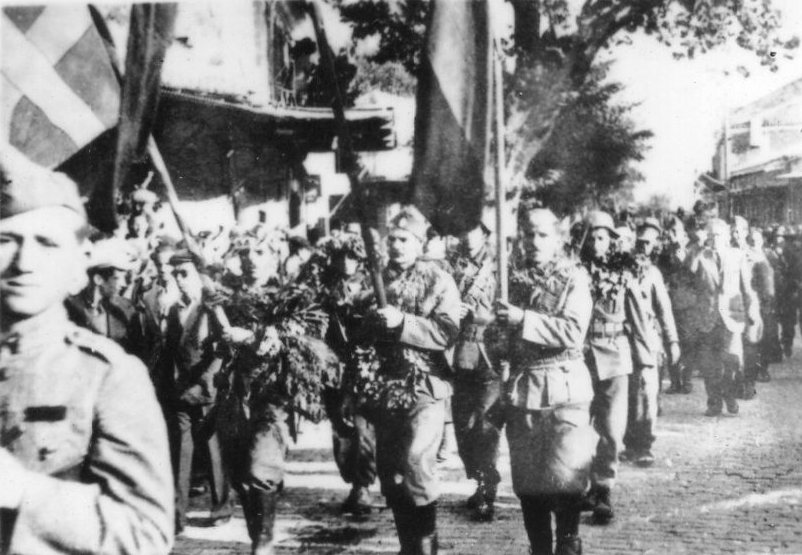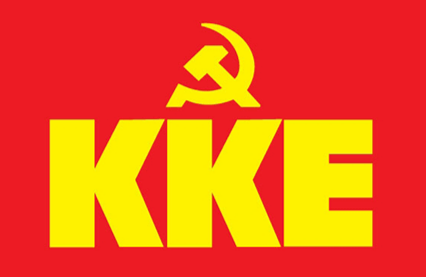|
Dimitris Glinos
Dimitris Glinos ( el, Δημήτρης Γληνός, September 2, 1882 – December 26, 1943) was a Greek philosopher, educator and politician. Life Glinos was born in Smyrna, the eldest of twelve children of Alexandros Glinos. After graduating from the Smyrna Evangelical School, he went to Athens in 1899 and enrolled in the Philosophy Department of the University of Athens. He graduated in 1905 and proceeded to study philosophy, pedagogy, and experimental psychology in Germany at the University of Jena (under Rudolf Eucken from 1908 to 1909), and at the University of Leipzig (under Wilhelm Wundt from 1909 to 1911). In Germany, he was acquainted with Georgios SklirosFor an extensive discussion of Skliros' views, see (in Greek) George D. Boubous«Neo-Hellenic Society in Early Greek Marxist Analysis: G. Skliros - G. Kordatos (1907-1930)», unpubl. PhD Diss., Panteion University: Athens, 1996 who introduced Glinos to socialist ideology and had decisive effect on his later caree ... [...More Info...] [...Related Items...] OR: [Wikipedia] [Google] [Baidu] |
İzmir
İzmir ( , ; ), also spelled Izmir, is a metropolitan city in the western extremity of Anatolia, capital of the province of the same name. It is the third most populous city in Turkey, after Istanbul and Ankara and the second largest urban agglomeration on the Aegean Sea after Athens. As of the last estimation, on 31 December 2019, the city of İzmir had a population of 2,965,900, while İzmir Province had a total population of 4,367,251. Its built-up (or metro) area was home to 3,209,179 inhabitants extending on 9 out of 11 urban districts (all but Urla and Guzelbahce not yet agglomerated) plus Menemen and Menderes largely conurbated. It extends along the outlying waters of the Gulf of İzmir and inland to the north across the Gediz River Delta; to the east along an alluvial plain created by several small streams; and to slightly more rugged terrain in the south. İzmir has more than 3,000 years of recorded urban history, and up to 8,500 years of history as a human settlemen ... [...More Info...] [...Related Items...] OR: [Wikipedia] [Google] [Baidu] |
Demotic Greek
Demotic Greek or Dimotiki ( el, Δημοτική Γλώσσα, , , ) is the standard spoken language of Greece in modern times and, since the resolution of the Greek language question in 1976, the official language of Greece. "Demotic Greek" (with a capital D) contrasts with Katharevousa, which was used in formal settings, during the same period. In that context, Demotic Greek describes the specific non-standardized vernacular forms of Greek used by the vast majority of Greeks during the 19th and 20th centuries. As is typical of diglossic situations, Katharevousa and Dimotiki complemented and influenced each other. Over time, Dimotiki became standardized. In 1976, it was made the official language of Greece. It continued to evolve and is now called Standard Modern Greek. The term "demotic Greek" (with a minuscule d) also refers to any variety of the Greek language which has evolved naturally from Ancient Greek and is popularly spoken. Basic features of Dimotiki Demotic Gree ... [...More Info...] [...Related Items...] OR: [Wikipedia] [Google] [Baidu] |
National Liberation Front (Greece)
The National Liberation Front ( el, Εθνικό Απελευθερωτικό Μέτωπο, ''Ethnikó Apeleftherotikó Métopo'' (EAM) was an alliance of various political parties and organizations which fought to liberate Greece from Axis Occupation. It was the main movement of the Greek Resistance during the occupation of Greece. Its main driving force was the Communist Party of Greece (KKE), but its membership throughout the occupation included several other leftist and republican groups. ΕΑΜ became the first true mass social movement in modern Greek history. Its military wing, the Greek People's Liberation Army (ELAS), quickly grew into the largest armed guerrilla force in the country, and the only one with nationwide presence. At the same time, from late 1943 onwards, the political enmity between ΕΑΜ and rival resistance groups from the centre and right evolved into a virtual civil war, while its relationship with the British and the British-backed Greek government ... [...More Info...] [...Related Items...] OR: [Wikipedia] [Google] [Baidu] |
Agios Efstratios
Agios Efstratios or Saint Eustratius ( el, Άγιος Ευστράτιος), colloquially Ai Stratis ( el, Άη Στράτης), anciently Halonnesus or Halonnesos ( grc, Ἁλόννησος), is a small Greek island in the northern Aegean Sea about southwest of Lemnos and northwest of Lesbos. The municipality has an area of 43.325 km2. Together with Lemnos and nearby islets it forms the regional unit of Lemnos, part of the Greek archipelagic region of the North Aegean. Name Anciently the island was known as Halonnesus, and under this name was a bone of contention between ancient Athens and Macedon as was noted in '' On the Halonnesus'', attributed to Demosthenes. The island was named after Saint Eustratius (Όσιος Ευστράτιος ο Θαυματουργός), who lived on the island in the 9th century as an exile, because he was opposed to the iconoclastic policies of the Byzantine Emperor Leo the Armenian. His grave is still being shown by the inhabitants. The ... [...More Info...] [...Related Items...] OR: [Wikipedia] [Google] [Baidu] |
Internal Exile In Greece
Internal exile was used to punish political dissidents by various Greek governments, including the Metaxas dictatorship, the government during the Greek Civil War, and the Greek junta. Those targeted were typically sent to smaller Greek islands. Over 100 locations were used for exile at various times in the 20th century. Background Internal exile has a long history of use by rulers of Greece, and in the early twentieth century was used for opponents of Venizelism, such as monarchists, conservatives or communists. During the National Schism and after the coming of Venizelos in power, in summer 1917, many political opponents (such as the former PM Spyridon Lambros) were put in internal exile. Exile was preferred to imprisonment on the mainland because the mainland prisons were overcrowded and exile made it easier to monitor the prisoners' correspondence and limit their political influence. The 1929 ''Idionymon'' law criminalized subversive ideas as well as actions, leading to ... [...More Info...] [...Related Items...] OR: [Wikipedia] [Google] [Baidu] |
Metaxas Regime
Metaxās or Metaxa may refer to: Places * Metaxas Line, fortifications in northeastern Greece in 1935–1940 * Metaxas, Greece, a village in the Greek region of Macedonia * Metaxas Regime or 4th of August Regime, a short-lived authoritarian regime in Greece from 1936 to 1941 People with the surname * Anastasios Metaxas (1862–1937), Greek architect and competitive marksman * Andreas Metaxas (1790–1860), Greek politician * Konstantinos Metaxas (1793–1870), Greek fighter of the Greek War of Independence and politician from Cephalonia * Christina Metaxa (born 1992), Cypriot singer * Dimitris Metaxas, Greek-American computer scientist * Doris Metaxa (1911–2007), French tennis player * Eric Metaxas (born 1963), American author * Georges Metaxa (1899–1950, Romanian singer and actor * Ioannis Metaxas (1871–1941), Greek general, prime minister and dictator * Nemone Metaxas (born 1972), English DJ, presenter, producer, and athlete * Nikolas Metaxas (born 1988), Cypriot singer ... [...More Info...] [...Related Items...] OR: [Wikipedia] [Google] [Baidu] |
1936 Greek Legislative Election
Parliamentary elections were held in Greece on 26 January 1936.Dieter Nohlen & Philip Stöver (2010) ''Elections in Europe: A data handbook'', p830 The Liberal Party emerged as the largest party in Parliament, winning 126 of the 300 seats.Nohlen & Stöver, p859 Results See also * 4th of August Regime References {{Greek elections Parliamentary elections in Greece Greece Legislative election 1930s in Greek politics Eleftherios Venizelos History of Greece (1924–1941) Greece Greece,, or , romanized: ', officially the Hellenic Republic, is a country in Southeast Europe. It is situated on the southern tip of the Balkans, and is located at the crossroads of Europe, Asia, and Africa. Greece shares land borders with ... Election and referendum articles with incomplete results Legl ... [...More Info...] [...Related Items...] OR: [Wikipedia] [Google] [Baidu] |
Communist Party Of Greece
The Communist Party of Greece ( el, Κομμουνιστικό Κόμμα Ελλάδας, ''Kommounistikó Kómma Elládas'', KKE) is a political party in Greece. Founded in 1918 as the Socialist Labour Party of Greece and adopted its current name in November 1924. It is the oldest political party in modern Greek politics. The party was banned in 1936, but played a significant role in the Greek resistance and the Greek Civil War, and its membership peaked in the mid-1940s. Legalization of the KKE was restored following the fall of the Greek military junta of 1967–1974. The party has returned MPs in all elections since its restoration in 1974, and took part in a coalition government in 1989 when it got more than 13% of the vote. History Foundation The October Revolution of the Bolsheviks in Russia in 1917 gave impetus for the foundation of Communist parties in many countries globally. The KKE was founded on 4 November 1918 as the Socialist Labour Party of Greece (Gr ... [...More Info...] [...Related Items...] OR: [Wikipedia] [Google] [Baidu] |
Theodore Pangalos
Lieutenant General Theodoros Pangalos (; 11 January 1878 – 26 February 1952) was a Greek general, politician and dictator. A distinguished staff officer and an ardent Venizelist and anti-royalist, Pangalos played a leading role in the September 1922 revolt that deposed King Constantine I and in the establishment of the Second Hellenic Republic. In June 1925 Pangalos staged a bloodless coup, and his assumption of power was recognized by the National Assembly which named him prime minister. As a " constitutional dictator" he ruled the country until his overthrow in August 1926. From April 1926 until his deposition, he also occupied the office of President of the Republic. Pangalos withdrew from public life for a while, but remained active in the Venizelist military circles. During the Axis occupation of Greece, Pangalos and military officers close to him played a role in the establishment of the Security Battalions. He was widely suspected of collaboration with the Germans. C ... [...More Info...] [...Related Items...] OR: [Wikipedia] [Google] [Baidu] |
Pseudonym
A pseudonym (; ) or alias () is a fictitious name that a person or group assumes for a particular purpose, which differs from their original or true name (orthonym). This also differs from a new name that entirely or legally replaces an individual's own. Many pseudonym holders use pseudonyms because they wish to remain anonymous, but anonymity is difficult to achieve and often fraught with legal issues. Scope Pseudonyms include stage names, user names, ring names, pen names, aliases, superhero or villain identities and code names, gamer identifications, and regnal names of emperors, popes, and other monarchs. In some cases, it may also include nicknames. Historically, they have sometimes taken the form of anagrams, Graecisms, and Latinisations. Pseudonyms should not be confused with new names that replace old ones and become the individual's full-time name. Pseudonyms are "part-time" names, used only in certain contexts – to provide a more clear-cut separation between o ... [...More Info...] [...Related Items...] OR: [Wikipedia] [Google] [Baidu] |






